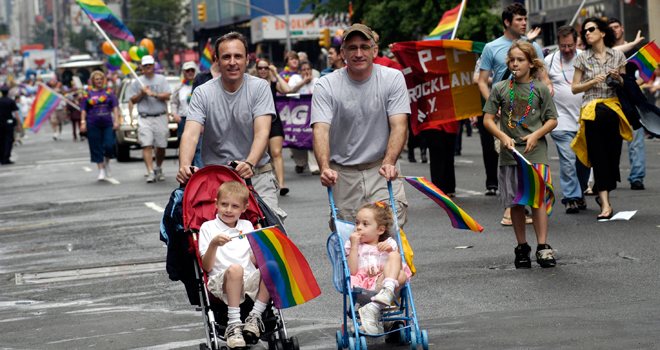As gay rights advocates have made gains over the last few years, the public seems to be moving in the same direction. Friday saw the release of a new poll sponsored by the Human Rights Campaign (HRC) and Citizens for Equal Protection showing citizens deep in the middle of conservative America – in Nebraska – are solidly for non-discrimination protections for members of the gay, lesbian bisexual and transgender (LGBT) community, even if the current state laws are not. 73 percent of Nebraskans surveyed support protecting LGBT people from discrimination in employment, protections which currently don’t exist there.
The survey comes as Public Policy Polling (D) has been polling a diversity of states on the question of gay marriage and civil unions. Those polls have shown that some version of recognition for same sex couples is popular: even in the most Republican state in the union, Utah, 60 percent supported either gay marriage or civil unions, a trend also reflected in a separate HRC polling of the state.
The Nebraska poll is significant because it shows that even in a solidly conservative state that is against gay marriage (registering a 51 – 42 break in opposition) there is strong support for non-discrimination protections for LGBT people. The question asked was straightforward: “Do you support the following? Protecting gay, lesbian, bisexual, and transgender people from discrimination in employment, housing, and public accommodation.” 73 percent did, with 20 percent against. Other majorities supported the ability of LGBT people to adopt children (56 – 40) and anti-bullying measures in schools (73 – 22).
“On the whole range of GLBT issues, the whole country is becoming more accepting,” said HRC Press Secretary Michael Cole-Schwartz. “What’s usually true is that government is a lagging indicator. The politicians are usually the last ones to get on board.”
Consequently, much of strategy for gay rights advocates in deeply red states is to affect change from the ground up. Cole-Schwartz says the HRC and other groups work to pass non-discrimination ordinances in cities and work with businesses to implement similar policies in the workplace, helping to create support for equal rights outside the political sphere. “There are just some states that passing a GLBT non-discriminational law is just a non-starter…You make progress by changing the non-governmental institutions. When faced with seesawing control of congress and legislatures, you can make changes where people work, where they go to church, where they seek health care.” Still, says Cole-Schwartz, there’s a ways to go. “Most people don’t even know you can be fired in 29 states for being gay.”
In the PPP surveys, majorities support either full marriage rights for LGBT people or civil unions in many swing states going into the 2012 election. Virginia voters supported one of the two options by a 65 percent margin, Florida by 67 percent, and Colorado by 71.
Additionally, a recent PPP survey of Vermont showed that a majority of even self-described conservatives admitted that the state’s 2009 legalization of gay marriage had no effect on their own lives, directly after New York became the 6th state in the union to allow same sex couples to marry.
The Nebraska poll utilized telephone interviews with 616 adults, with an oversample of Omaha (305 residents), and has a sampling error of plus or minus four percent.
Get the day’s best political analysis, news and reporting from the TPM team delivered to your inbox every day with DayBreaker. Sign up here, it takes just a few seconds.









